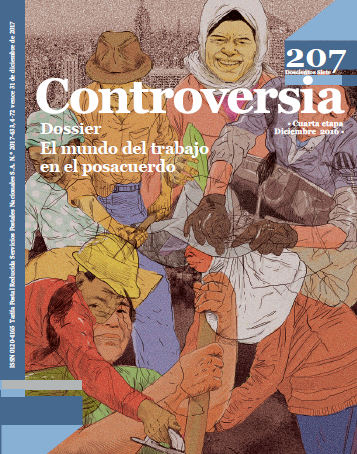Resumen
Los dos tratados de libre comercio firmados por Colombia con los Estados Unidos (2012) y Perú y la Unión Europea (2013) no solo marcaron el eje central de la política de apertura e integración económica de los gobiernos de Álvaro Uribe y Juan Manuel Santos, sino también pusieron a prueba la capacidad del Gobierno estadounidense y las instituciones de la Unión Europea para asegurar que sus políticas comerciales hacia países del Sur, como Colombia, pudieran mejorar las precarias condiciones laborales de gran parte de la población trabajadora y la capacidad estatal para proteger y garantizar los derechos laborales fundamentales y demás derechos sociales. Este artículo analiza las diferencias en ambos modelos de negociar temas laborales y compara el grado de impactos sociales positivos que ambos TLC han traído a Colombia varios años después de su implementación.
Palabras clave: Tratados de libre comercio, acuerdos laborales paralelos, derechos laborales fundamentales, plan de acción laboral, Resolución 2628.
Abstract
The Labor Issue in FTA Negotiations: Lessons from Colombia’s Experiences with FTAs with the United States and the European Union
Free Trade Agreements (FTAs) signed by Colombia with the United States (2012) and Peru and the European Union (2013) not only marked the central axis of the economic liberalization and integration policy of Alvaro Uribe and Juan Manuel Santos governments, but they also put to test the ability of the US government and the EU institutions to ensure that their commercial policies with countries of the South, such as Colombia, would improve the precarious working conditions of a considerable part of the working population. Furthermore, they also challenge the capacity of the Colombian state to protect and guarantee fundamental labor rights and other social rights. This article examines the differences between both models of negotiating labor issues and compares the degree to which both FTAs have actually brought about positive social impact in Colombia a few years after their formal implementation.
Key words: Free Trade Agreements, Parallel Labor Agreements, Fundamental Labor Rights, Labor Action Plan, Resolution 2628.
Referencias
AFL-CIO (2016). ¿Un Patrón Oro para los trabajadores? Estado de los derechos laborales en los países del Acuerdo Transpacífico de Asociación Económica. Washington D. C.: AFL-CIO.
Arroyo Picard, A.; Rodríguez, G. y Castañeda Bustamante, N. (2009, abril). The European Union: promoter of regional integration in Latin America? Rhetoric and Reality. Debate Document Alternative Regionalisms Programme. TNI: RMALC.
Aghion, P.; Antrás, P. y Helpman, E. (2007). Negotiating free trade. Journal of International Economics, (73), 1-30.
Bhagwhati, J. (2004). In Defense of Globalization. New York: Oxford University Press. Boskin, Michael J. (2015, octubre 29). The case for the TPP. Project Syndicate. Recuperado de https://www.project-syndicate.org/commentary/tpptradegrowth-international-cooperation-by-michael-boskin-2015-10
Burgess, K. (2010). Global pressures, national policies, and labor rights in Latin America. Studies in Comparative International Development, (45), 198-224.
Compa, L. (2001). NAFTA’s labour side agreement and international labour solidarity. Recuperado de Cornell University, ILR School: http://digitalcommons.ilr.cornell.edu/articles/175/
Compa, L. (2014). Labor rights and labor standards in transatlantic trade and investment negotiations: An American perspective. En C. Scherrer (Ed.). The Transatlantic Trade & Investment Partnership (TTIP): Implications for Labor (pp. 120-136). Múnich: ICDD, Rainer Hampp Verlag.
Compa, L. (2016, enero 14). How to make the Trans-Pacific Partnership work for workers and communities. The Nation. Recuperado de http://www. thenation.com/article/how-to-make-the-trans-pacificpartnership-work-forworkers-and-communities/
Council of the European Union (1999, octubre 26). WTO: Preparation of the Third Ministerial Conference. 12121/99, 2209ª reunión del Consejo, Luxemburgo. [Comunicado de prensa].
Doumbia-Henry, C. y Gravel, E. (2006). Free trade agreements and labour rights: Recent developments. International Labour Review, 145(3), 185- 206.
Eberhardt, P. (2014). Investment protection at a crossroads. En C. Scherrer (Ed.). The Transatlantic Trade & Investment Partnership (TTIP): Implications for Labor (pp. 100-119). Múnich: ICDD, Rainer Hampp Verlag.
Hepple, B. (2005). Labour Laws & Global Trade. Oxford y Portland: Hart Publishing. Jiménez, G. (2006, abril 6). El TLC traerá beneficios para todo el país: Uribe.
El Colombiano. Kucera, D. (2002). Core labour standards and foreign direct investment. International Labour Review, 141(1-2), 31-69.
Meyer, M. (2005). La implementación de la Cláusula Democrática en el Acuerdo Global México-Unión Europea un reto a futuro. En M. Atilano (Ed.) México la Unión Europea: Sociedad Civil y Gobierno. 2º Foro de Diálogo Social (pp. 28-30). México: RMALC. OCDE (2002). Foreign Direct Investment for Development: Maximising Benefits, Minimising Costs. París: OCDE.
Polaski, S. (2004, julio 14). Protecting labor rights through trade agreements: An analytical guide. Journal of International Law & Policy, 10(1).
Patel-Campillo, A. (2010). Rival commodity chains: Agency and regulation in the US and Colombian cut flower agroindustries. Review of International Political Economy, 17(1), 77-102.
Portafolio (2006). Las ventajas y desventajas del TLC. Portafolio. Recuperado de http://www.portafolio.co/economia/finanzas/ventajasdesventajastlc-416776
Red Peruana por una Globalización con Equidad (2015, agosto). Impactos de los Acuerdos Comerciales Internacionales adoptados por el Estado peruano en el cumplimiento y promoción de los derechos humanos en Perú. Lima: RedGE. El tema laboral en las negociaciones de los TLC: lecciones de las experiencias de Colombia frente a los TLC con los Estados Unidos y la Unión Europea
Rettberg, A.; De Lombaerde, P.; Lizarazo Rodríguez, L. et al. (2014, mayo-agosto). Rights, free trade and politics: The strategic use of a rights discourse in the negotiation of free trade agreements (FTAs). Colombia Internacional, 81, 129-165.
Scherrer, C. (Ed.) (2014). The Transatlantic Trade & Investment Partnership (TTIP): Implications for Labor. Múnich: Rainer Hampp Verlag. Schrank, A. (2013, septiembre). From Disguised Protectionism to Rewarding Regulation: The Impact of Trade-Related Labor Standards in the Dominican Republic. Regulation & Governance, 7(3), 299-320.
Siroën, J.M. (2013). Disposiciones laborales en los tratados de libre comercio: balance y perspectivas. Revista Internacional del trabajo, 132(1), 99-122.
Stiglitz, J. (2013, julio 4). The free trade charade. Proyect Syndicate. Recuperado de https://www.project-syndicate.org/commentary/transatlantic-and-transpacific-free-trade-trouble-byjoseph-e--stiglitz
Wade, R. H. (2004). On the Causes of Increasing World Poverty and Inequality, or Why the Matthew Effect Prevails. New Political Economy, 9(2), 163-188.
Woolcock, S. (2007). European Union policy towards Free Trade Agreements. ECIPE Working Paper, n.º 3.
Van den Putte, L.; Bossuyt, F.; Orbie, J. et al. (2013). Social norms in EU bilateral trade agreements: a comparative overview. En T. Takacs, A. Ott y A. Dimopoulos (eds). Linking trade and noncommercial interests: the EU as a global role model. La Haya: TMC Asser Institutute
Van den Putte, L.; Orbie, J.; Bossuyt, F. et al. (2015). What social face of the new EU trade agreements? Beyond the “soft” approach. ETUI Policy Brief. European Economic, Employment & Social Policy, (13).
Yencken, E. (2016). Lessons from CETA: Its implications for future EU Free Trade Agreements. Melbourne: University of Melbourne. Recuperado de http://www.oefse.at/fileadmin/ content/Downloads/tradeconference/ Yencken_Lessons_from_CETA__Implications_for_future_EU_FTAs.pdf



